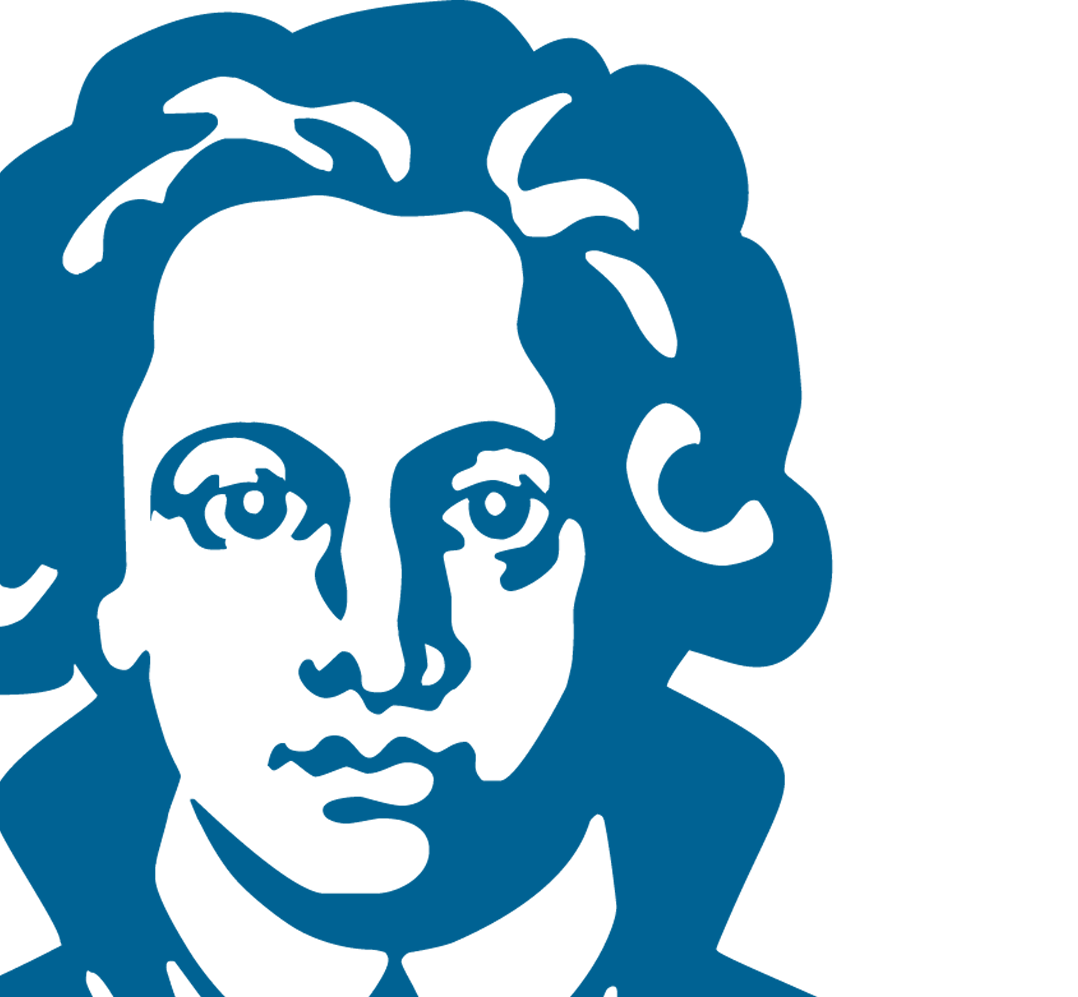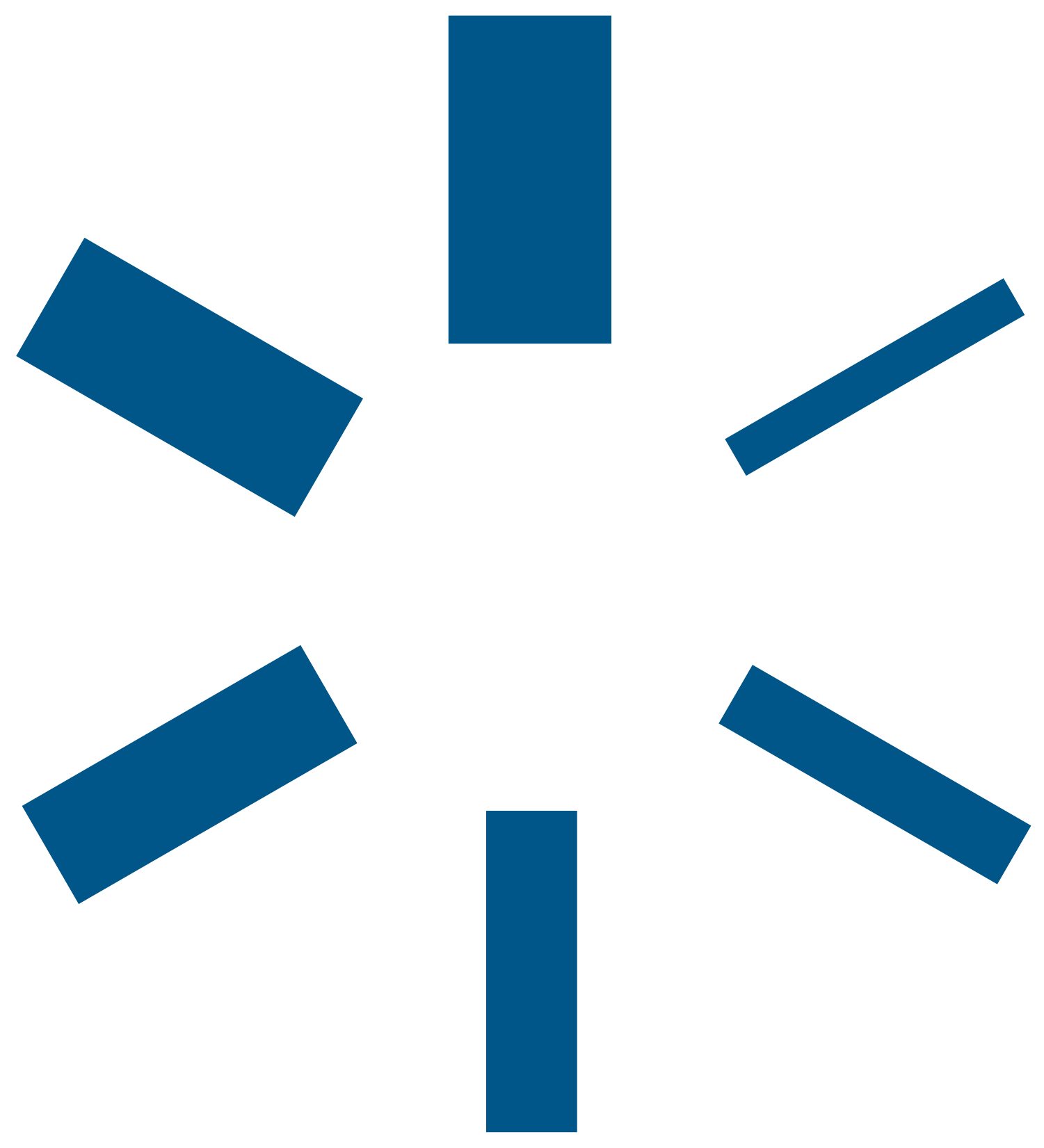
Goethe in progress 2023 – Interaktion & Kooperation
Strength rests on Alliances
In the region, for example, Goethe University 2023 has expanded the organizational basis of the strategic alliance of Rhine-Main Universities (RMU) for successful cooperation with its partner universities. And it has found further partners when it comes to transferring scientific ideas into business practice. Goethe University is also strong with others because it networks and cooperates internationally.
Do good and talk about it! This also applies to the researchers at Goethe University: some highlights of Goethe University Science Communication 2023 explain how they make science understandable in dialog with interested citizens.
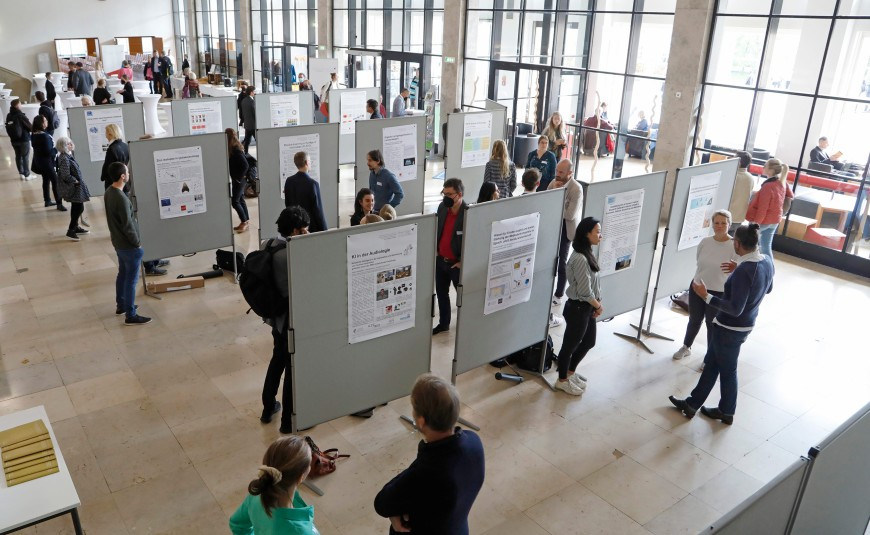
- RMU
Strategic projects, new governance
How the Rhine-Main University Alliance is developing and a science region is picking up speed
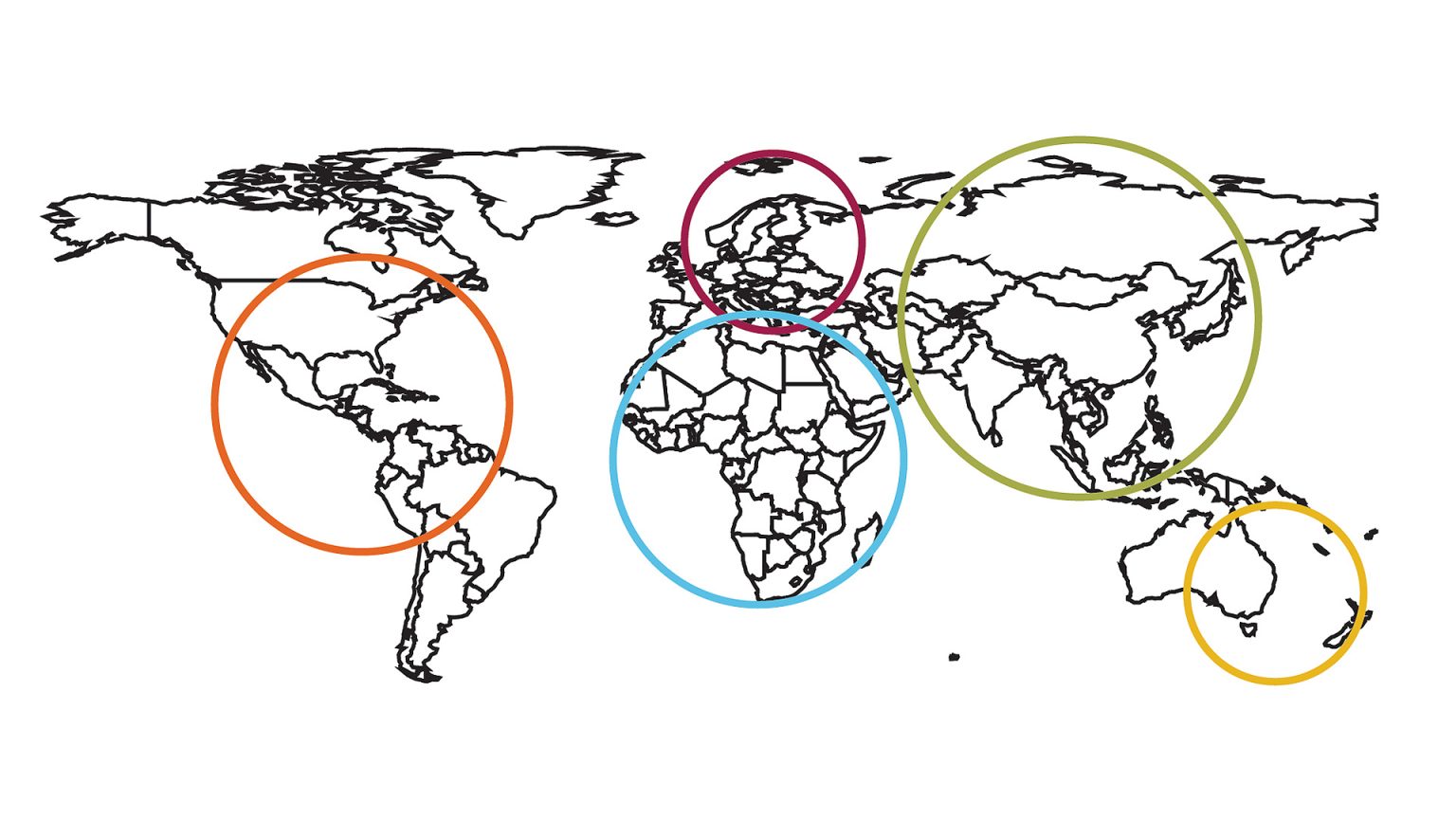
- In International
"We actually need a welcoming structure rather than a welcoming culture"
Internationalization needs allies – an overview of new scholarships, collaborations and projects. Two discussions focus on Goethe University and the world.
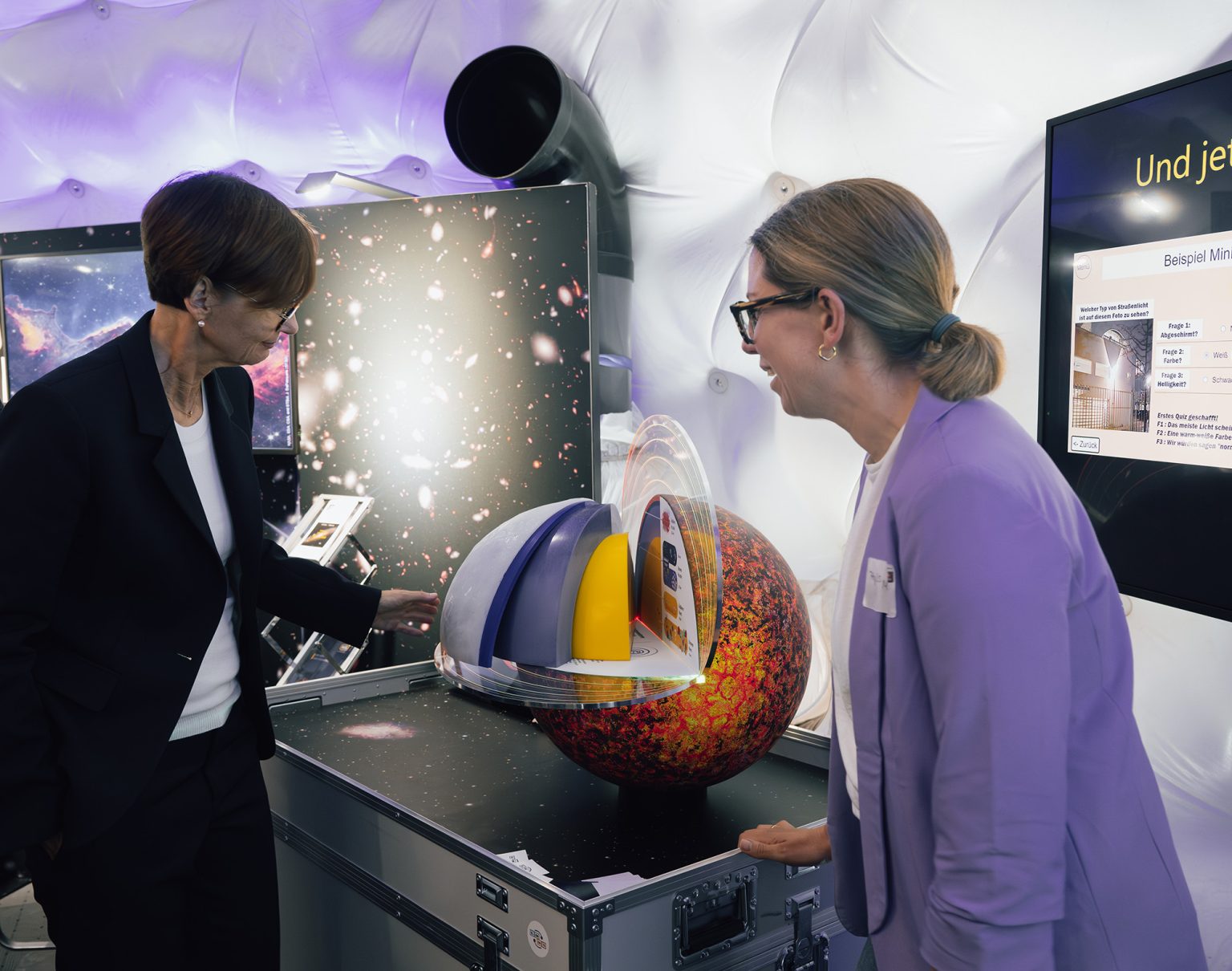
- Science communication
Do good and talk about it
This also applies to the researchers at Goethe University. In dialog with interested citizens, they explain science and make it understandable. Such as in the new science talk "Wissen angezapft" (Knowledge tapped) at various locations in the city.
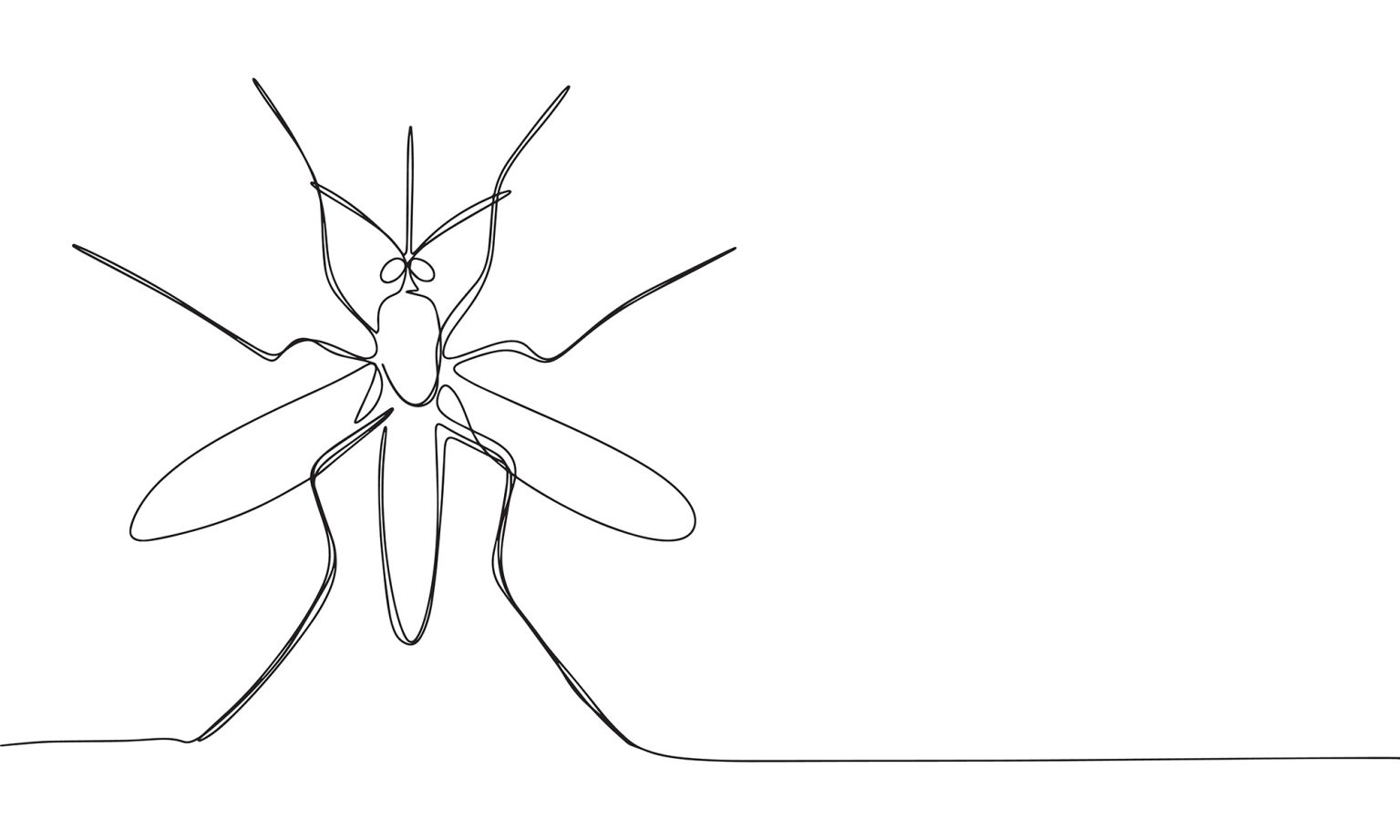
- Transfer
Therapeutic approaches against flaviviruses promoted industrially
Researchers at Goethe University, together with partners from the life science and pharmaceutical industries, have launched a project to develop a new class of active substances against flaviviruses. This could be used to cure infectious diseases such as dengue fever in the future.
Short & sweet
Photo: Uwe Dettmar
- RMU
Strategic projects, new governance
How the Rhine-Main University Alliance is developing and a science region is picking up speed
Strong together as partners in research, study and teaching projects, transfer and coordinated support structures: Goethe University Frankfurt, TU Darmstadt and Johannes Gutenberg University Mainz joined forces at the end of 2015 to form the Strategic Alliance of Rhine-Main Universities (RMU). With the establishment of a central office and a board of directors in 2023, the organizational basis for successful cooperation has now also been expanded – a step in the extensive transformation process for the further development of the RMU, which was initiated in 2021. The aim is to develop the Rhine-Main metropolitan region into an internationally leading, globally visible science region.
A brief look back: how it all began
Right from the start, the RMU Alliance had more to offer than just an official commitment to cooperation. Joint funding, the RMU Research Initiative Fund and its counterpart, the RMU Teaching Initiative Fund, have been supporting cross-university collaborations since 2016 and 2017 respectively. The RMU Study Program was launched in the 2020/21 winter semester. This enables students who are enrolled at one of the three universities to attend selected courses at the other two universities, take examinations and earn credit points at no additional cost and with little administrative effort. In addition, there are already seven bilateral cooperative study programs between Goethe University and TU Darmstadt and Mainz University – and more are in preparation.
Looking ahead: three spaces for strategy projects
However, the RMU Alliance wants to go much further and turn the Rhine-Main science region into an internationally leading, globally recognized player. A large number of strategic processes have been launched since 2021 in order to get closer to this goal step by step. These strategic processes are organized along the lines of the three spaces model:
The innovation space
- Fellowships and visiting professorships strengthen RMU's areas of focus through the targeted integration of national and international expertise.
- Coordinated support structures enable responsible and synergistic start-up promotion, particularly in the areas of greentech, fintech and biotech.
- The exchange of knowledge with business, politics and society creates space for cooperation and dialog with different stakeholders.
- A joint institute (working title "RMU T3 Institute" [T3 = Thinking Tomorrow Today]) is to identify future topics and sustainable forms and structures of scientific organization.
The interaction space
- Regular promotion of research and teaching cooperations within the RMU, adapted to the needs of science, provides incentives and support for bottom-up initiatives (= the RMU initiative funds, see above).
- A more strongly coordinated and comprehensively harmonized appointment planning serves as an instrument for strengthening existing and creating new focal points of the RMU.
- Joint and coordinated communication increases the regional, supra-regional and international visibility of RMU's expertise and performance.
The opportunity space
- The expansion of the RMU study program (RMU studies, joint courses, module openings, joint degree programs) creates a space for students that is unique in Germany.
- The coordinated expansion of funding, advice, support and exchange opportunities for early career researchers enables individual future planning and the start of an academic career.
- The expansion of dual career and further education opportunities opens up many options for employees at the three RMU universities for their personal development, the enhancement of individual potential and individual career planning.
The ambitious goals for the Rhine-Main University Alliance also require central governance structures that have an integrative and participatory effect. Two initial milestones have now been reached: The RMU office began its work on March 1, 2023. Its task is to coordinate the central activities of the RMU. The previous RMU Steering Committee, consisting of the three presidents and chancellors of the Alliance universities, will become a Board of Directors. This is made up of the elected members of the Presidium of the partner universities. Each year, one president takes over the role of spokesperson for RMU. On April 1, Prof. Dr. Tanja Brühl from TU Darmstadt started as the first spokesperson for the RMU. The establishment of an advisory board is also in preparation. The members of this RMU Advisory Board will be internationally renowned figures in science and science management. Further elements will follow. These will ensure the representation of the university members and provide the Rhine-Main Universities Alliance with internal and external expertise.
Andreas Karg, Imke Folkerts
- How the RMU was active in 2023 – a selection
- Science meets Regions: As part of a European Commission program, RMU scientists entered into dialogue with representatives from Hessian and Rhineland-Palatinate state institutions and city administrations in the Rhine-Main region.
- RMU-Kooperationsstudiengang: The new international Master's degree program "Soft Matter and Materials" will start in the winter semester 2023/2024 as a cooperative degree program between Johannes Gutenberg University Mainz and Technische Universität Darmstadt.
- Tag der RMU: The 5th RMU Day on November 10, 2023 will take place on the Lichtwiese campus of the Technical University of Darmstadt under the motto "Region Matters for U – Shaping Innovative Science in Rhine-Main Together".
- RMU-InitiativfondsNumerous initiative funds for teaching and research are approved.
- RMU-Wochen der Chancengleichheit for research alliances take place in May and June.
- RMU Postdoc Career Weeks take place in June.
- RMU-Italienforum: Lecture series "L'italia In Bocca. Cibo Italiano Come Politica Culturale/ The Taste of Italy. Italian food as cultural politics"
- RMU ECR-Hub: In January, the conception of an exchange platform for R3 scientists at RMU will start.
- RMU Zukunftsinstitut: The concept for a joint institute to secure and strengthen RMU's innovative capacity will also be launched at the beginning of the year.
Graphic: Study Teaching International
- International – Global Office
"We actually need a welcoming structure rather than a welcoming culture"
Internationalization needs allies – at your own university and in the world. A conversation with the new head of the Global Office in the International Student Affairs division, Dr. Johannes Müller, about how student mobility has changed and what Goethe University can do to become even more international.
Dr. Müller, you recently became head of the Global Office and bring experience from the University of Cologne with you. What should we know about you?
University President Schleiff's vision is to create an excellent and international university in the digital age. What is the "division of tasks" in internationalization between the President's Office and the Global Office?
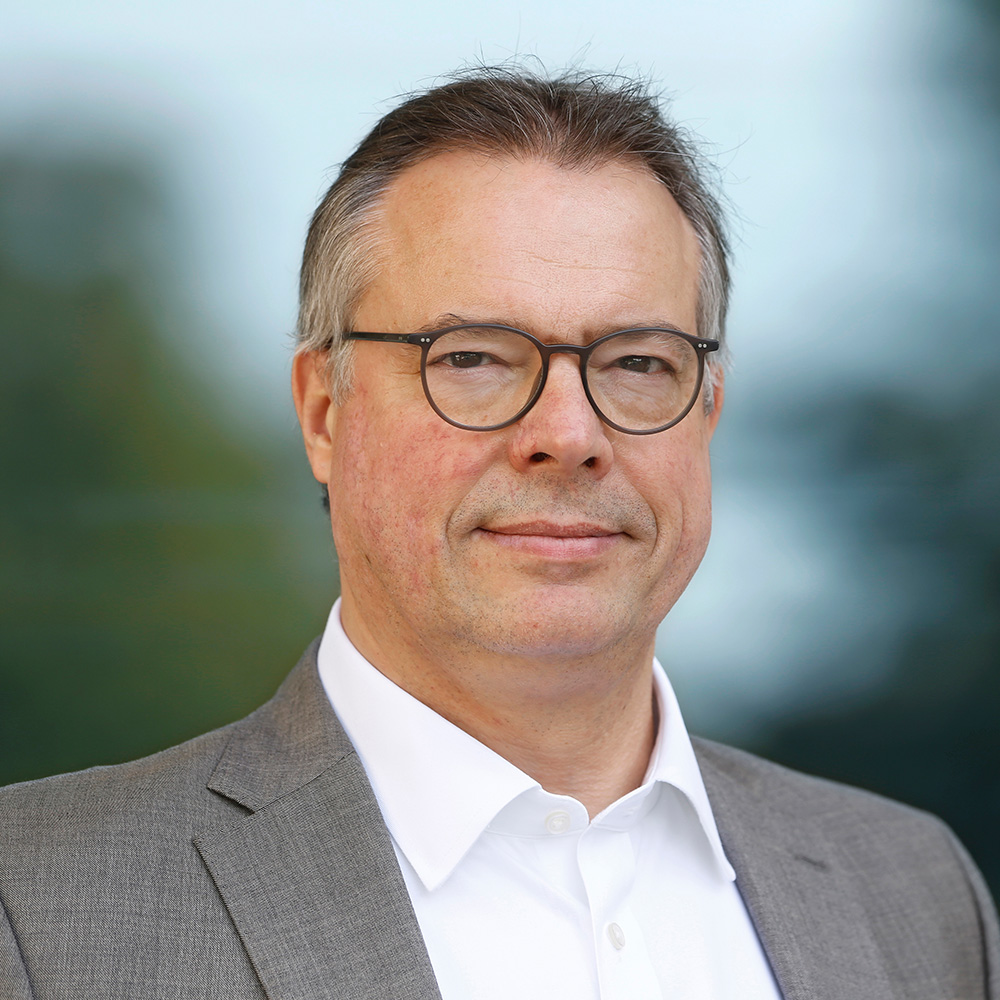
Johannes Müller
Photo: Uwe Dettmar
What priorities would you like to set as Head of the Global Office?
Goethe University has a broad network of partnerships, some centralized at university level, some decentralized in the departments. What role does the Global Office play in each case – how can you provide support? And do you ever advise against new partnerships?
Goethe University's "Basic Law" is its mission statement, in which it commits itself to certain values. What about cooperation with third countries where, for example, human rights are not respected – are there political and ethical limits to cooperation here? Or is it all the more important to stay in contact across borders in order to find the scientific "truth"?
Where the students at Goethe University come from
Studium Lehre Internationales: Dr. Rebekka Göhring, Christoph Götz
Student mobility is traditionally at the heart of the international university – whether it's a semester abroad or an internship abroad. How actively do students at Goethe University take advantage of such opportunities – also in comparison with other German universities?
Conversely, who comes from abroad to study in Frankfurt? And are these more people who want to study here on a regular basis or who are transferring from their home university to the partner university for one or two semesters?
As far as I know, only a few departments at Goethe University have their own internationalization experts. How can such a decentralized point of contact boost the internationalization of a department?
Questions: Imke Folkerts
- Being international is part of the GU identity
In 2024, Goethe University will start developing a comprehensive internationalization strategy. This participatory process is based on the university's internationalization mission statement. Among other things, it states that internationality and diversity are part of Goethe University's identity and are therefore understood as a continuous and self-evident cross-sectional task of all areas and processes at Goethe University.
The process will also take into account the key points that the German U15 2023 has developed for the federal and state science ministries. The German U15 is an association of fifteen major research-intensive and medical universities in Germany with a full range of subjects, of which Goethe University is a member.
With the principle of iMainstreaming, Goethe University is not only pursuing the goal of making its service functions multilingual, but also of thinking through all processes from both a German and an international perspective wherever possible. To what extent is the Global Office already living this idea?
Recently, it was reported in the media that one of the reasons why many international professionals are not interested in Germany is that they are not particularly welcome here. Applied to Goethe University, what are we doing to welcome our international academics?
If you yourself were now at the point of being able to go abroad for your studies or research: Where would you be drawn to?
Questions: Imke Folkerts
- International – GREP
New ambassador for Goethe University
The new research fellowship "Goethe Research Experience Fellowships" enables international students to spend a research stay at Goethe University. The first scholarship holder in the summer semester 2023 was Yuli Ketain Meiri.
Yuli Ketain Meiri normally devotes herself to her Master's degree in Social Work at the Hebrew University of Jerusalem in Israel. In the summer semester of 2023, however, she has changed her place of study: At the Department of Education at Goethe University, she is researching the experiences and perceptions of children in LGBTQ families for her Master's thesis under the supervision of Professor Sabine Andresen.
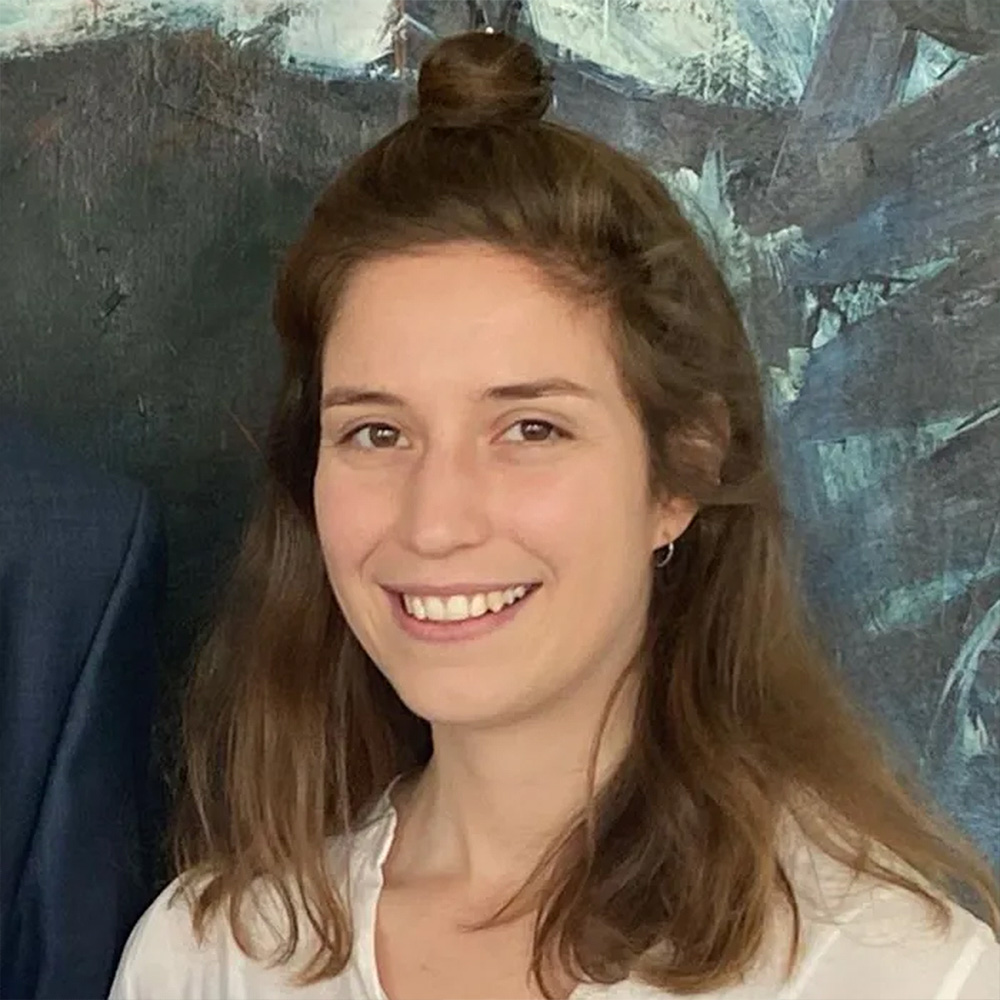
Yuli Ketain Meiri
Photo: Leonie Jürgens
This was made possible by a four-month research scholarship awarded by the Goethe Research Experience Program (GREP) to particularly qualified international Bachelor's and Master's students. University President Professor Enrico Schleiff welcomed Yuli Ketain Meiri as the program's first scholarship holder. "With the Goethe Research Experience Program, we not only want to promote talented young researchers, we also want to attract ambassadors for Goethe University worldwide," said Schleiff. In this way, the program contributes to the further development and consolidation of international research cooperation with top-class universities – such as the partnership with the Hebrew University of Jerusalem in this case.
The program is coordinated by the Global Office in the International Studies Department and developed in close coordination with priority projects in the research profile areas. For example, students on the Master's programs in religious studies will be able to complete research stays at both universities as part of the newly founded Frankfurt-Tel Aviv Center for Interreligious Studies. The Sagol School of Neuroscience at Tel Aviv University (TAU) and the Interdisciplinary Center for Neuroscience at Goethe University are also working on opening up the obligatory laboratory internship in the M.Sc. in Interdisciplinary Neuroscience at Goethe University to Master's students from TAU. Further GREP collaborations with top universities worldwide are currently being planned by the Global Office.
The scholarships are financed by the Adickes Foundation Fund and the Johanna Quandt Anniversary Fund.
Leonie Jürgens/pb
Further information can be found here: The Goethe Research Experience Programme
- International – Cooperation
Exploring childhood globally
The two universities have been working together as partners for a long time. In November 2023, Goethe University Frankfurt and the Hebrew University of Jerusalem signed a cooperation agreement to establish the Center for Childhood and Child Welfare in Context.
Goethe University Frankfurt and the Hebrew University of Jerusalem have been engaged in extensive research, the promotion of young academics and outstanding achievements in university teaching for many years. Notable joint initiatives of their partnership include an international study on the well-being of children and other empirical studies on the rights, interests and needs of children and young people, as well as research on violence and neglect in families or educational institutions in both Germany and Israel. In addition, an annual German-Israeli Master's seminar has been held since 2016.
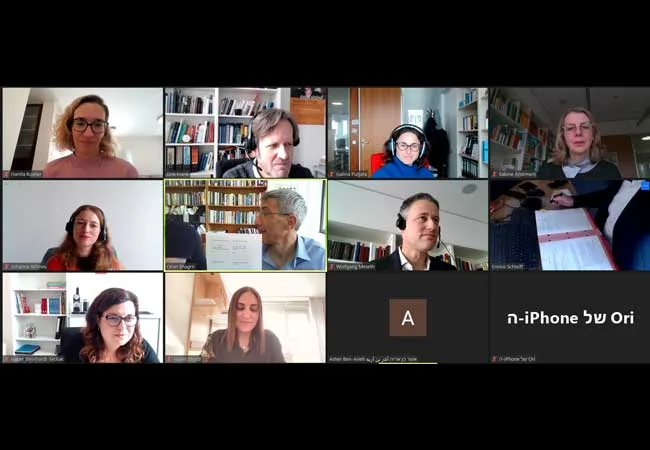
The primary aim of the research cooperation is to deepen and expand academic and scientific cooperation in childhood research and social science research. The new "Center for Childhood and Child Welfare" will focus on a number of key topics. These include the implementation of children's rights, dealing with structural bottlenecks such as a shortage of skilled workers and experiences with displacement. In addition, the Center will also examine issues related to professionalization, quality, digitality, digitalization, global warming and biodiversity. The aim of the center is to help ensure that children and young people also have a voice in research. Age will also be examined as a social category.
Scientists from various disciplines such as childhood research, family research, educational science, pedagogy, migration research, social work and healthcare from both universities are involved in the center. The aim of the center is to make an innovative contribution to global childhood research and to promote networking in this field.
df
- International – Summer School
Summer School Emergency Medicine
A shrill tone sounds and the medical students jump up almost synchronously. They rush to the other end of the room, grab one of the numbered slips of paper and read it carefully. A tone sounds again, this time it's a siren. And within seconds, the room is empty. The trainee doctors are practising what it means to be an emergency doctor. They are assigned to different cases in groups. They have just twelve minutes to familiarize themselves with the next scenario, rush to the patient and treat them.
A shrill tone sounds and the medical students jump up almost synchronously. They rush to the other end of the room, grab one of the numbered slips of paper and read it carefully. A tone sounds again, this time it's a siren. And within seconds, the room is empty. The trainee doctors are practising what it means to be an emergency doctor. They are assigned to different cases in groups. They have just twelve minutes to familiarize themselves with the next scenario, rush to the patient and treat them.
Scenario training courses like these are organized by the Frankfurt Institute for Emergency Medicine and Simulation Training, or FIneST for short. Medical students are taught practical skills there. And in an environment that is as realistic as possible. However, the 14 medical students who spend the first two weeks of September at the University Hospital learning the basics of emergency medicine and then putting them into practice are not students from Frankfurt. They come from the Ukraine and are studying in Kharkiv, Kiev or Odessa. Because of the war, their studies consisted mainly of online lessons, which can be a particular hindrance for a subject as practical as medicine.
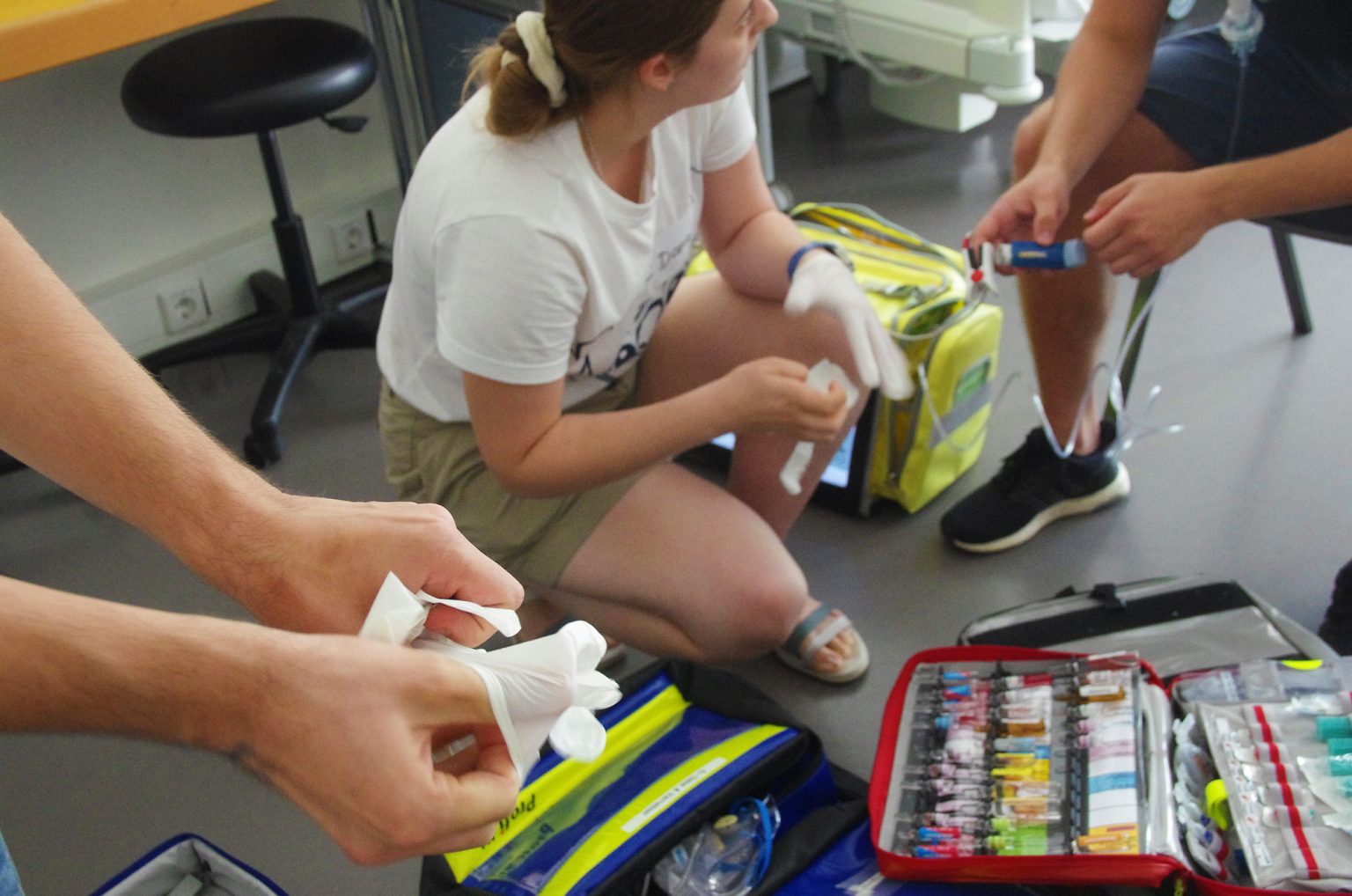
Two weeks of normality
In order to provide Ukrainian students with important practical experience, the head of FIneST, Prof. Miriam Rüsseler, has initiated a summer school. Miriam Rüsseler is a teaching officer for Surgery and Emergency Medicine and Dean of Studies at the Faculty of Medicine. "We wanted to offer the students two weeks of normality in their studies," she says. When she found out that there was hardly any teaching in Ukraine, she asked herself how she could help. Simply admitting the students to the faculty was not a solution, especially as the medicine course has capacity restrictions. However, it was clear that practical training was what the students needed most – and so the idea for the summer school was born. With the help of her colleagues at FIneST and through intensive preparation, Miriam Rüsseler succeeded in making this project a reality. Funding was provided by the Goethe University's Goethe-Ukraine Fund, with the main funding coming from the Dr. Gerhard and Martha Röttger Foundation.
Miriam Rüsseler and her team selected 15 students from around 50 applications. After one rejection, 14 students were able to spend two weeks gaining practical experience at Frankfurt University Hospital. The main requirements for participation in the summer school were a good knowledge of German and an advanced medical degree.
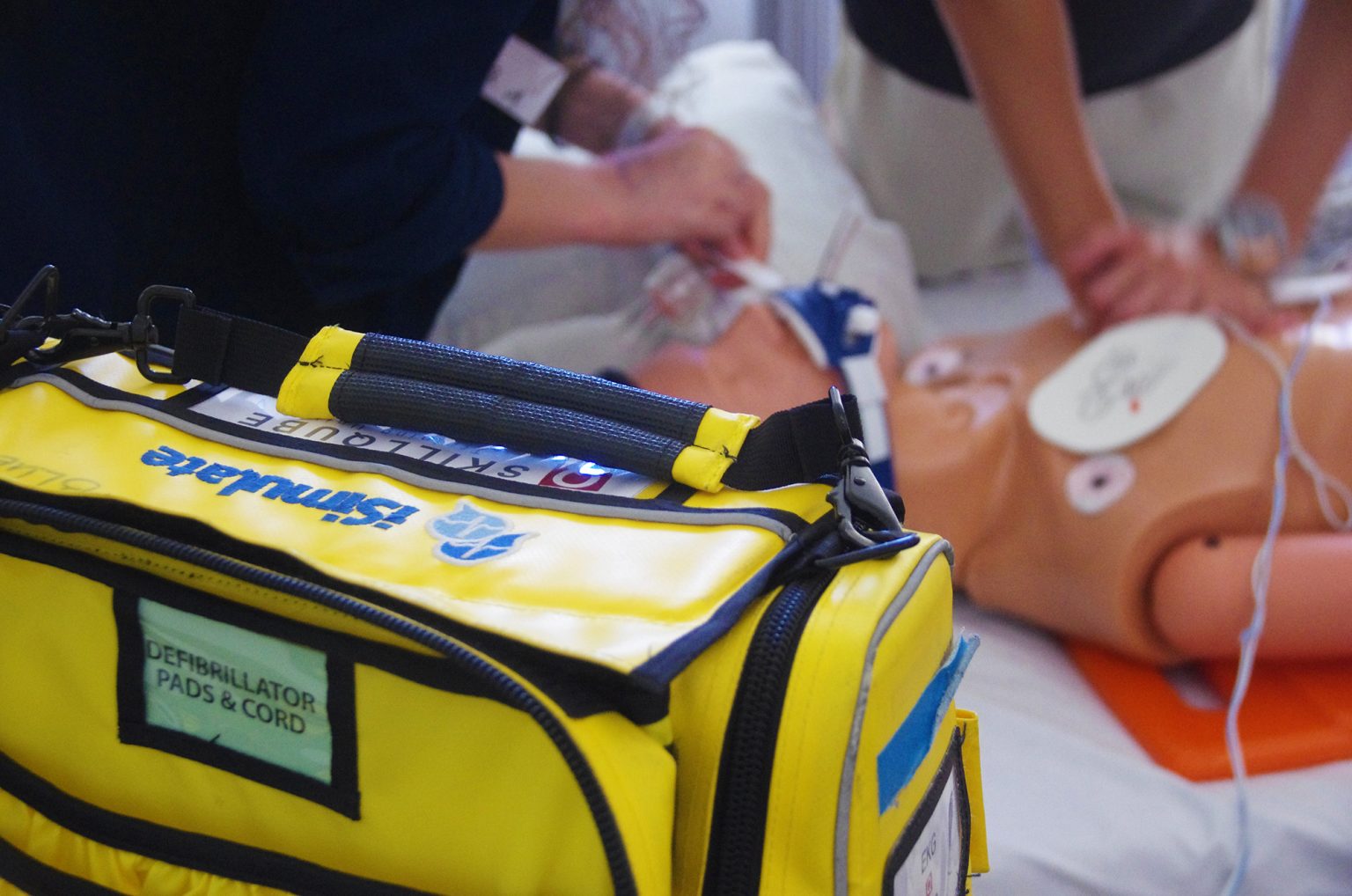
Exceptional commitment
One of the co-organizers of the project is Michael Keil, Head of the Human Medicine course development department. The Summer School is the subject of his doctoral thesis. He will ask the participants about their impressions afterwards, collect suggestions and proposals for improvement and evaluate the observations. The results will then be incorporated into follow-up projects. During the two weeks, Michael Keil will be the contact person for the Ukrainian guests. He guides them through the supporting program, explains the procedures and is also available to answer practical questions, such as the opening hours of the canteen. Michael Keil is particularly impressed by the students' commitment. "All participants were given access to the learning bar in advance so that they could acquire theoretical knowledge via eLearning," reports Michael Keil. They all made intensive use of the offer and were thus well prepared for the practical part of the summer school.
This impression is also confirmed by Lisa Petersen, who is responsible for organizing the medical program of the summer school. She recently graduated from medical school herself and is also part of the team at FIneST. Together with Michael Keil, Lisa Petersen is conducting the emergency simulation training this Friday. "Right from the start, we sensed that the students were very motivated and curious. But that they were also a bit scared or had a lot more respect for the situation because they didn't know exactly what was expected of them." However, after the first day, the students were so enthusiastic that they voluntarily stayed at the university hospital for an extra two hours in the evening to practice.
Close to the (acting) patient
At the end of the first week of the Summer School, the 14 students put what they have learned in theory over the past few days to the test in the simulation hospital. They take it in turns to be assigned to different emergencies in small teams. They have no idea what awaits them behind the doors of the "patient" rooms. In room 3, a patient complains of breathing difficulties. The emergency team asks about the symptoms, clarifies pre-existing conditions and measures blood pressure. The students are highly concentrated. Despite minor communication problems, they look after the patients with such seriousness that you almost forget that the situation is only a mock-up. The exercise is carried out under the expert eye of an FIneST employee. They assess the performance of the trainee doctors after each exercise and give them direct feedback.
Between two assignments, 20-year-old Valentyn draws a preliminary conclusion: "We have all learned and practiced a lot, the internship is really practice-oriented." He is from Mariupol, where he is currently unable to continue his medical studies due to the war. "We were able to practise procedures such as chest compressions, which are important in emergency situations. We are all very grateful to the University of Frankfurt for this opportunity." For Valentyn and the other Ukrainian medical students, the practical exercise continues this Friday afternoon. Not all teams have yet completed each of the five emergency missions. In the second week of the summer school, practical skills such as taking blood and stitching wounds will be on the curriculum.
For Miriam Rüsseler, the feedback from the students and her own observations already speak for themselves. She sees this year's summer school as a pilot project and is definitely planning to continue the practical course, then directly in Ukrainian. She already has the support of some Ukrainian-speaking doctors at the university hospital. The only thing missing now is funding.
Isabelle Hammerschmiedt
The interview was published in UniReport 5/23.
- International – World politics
A lot of concern, a lot of speechlessness, but also clear expectations of the universities
How did the terrorist attacks of October 7 and the Israeli operation in Gaza resonate at Goethe University? A conversation immediately after the events with the Islamic scholar Armina Omerika and the Judaist and Protestant theologian Christian Wiese.
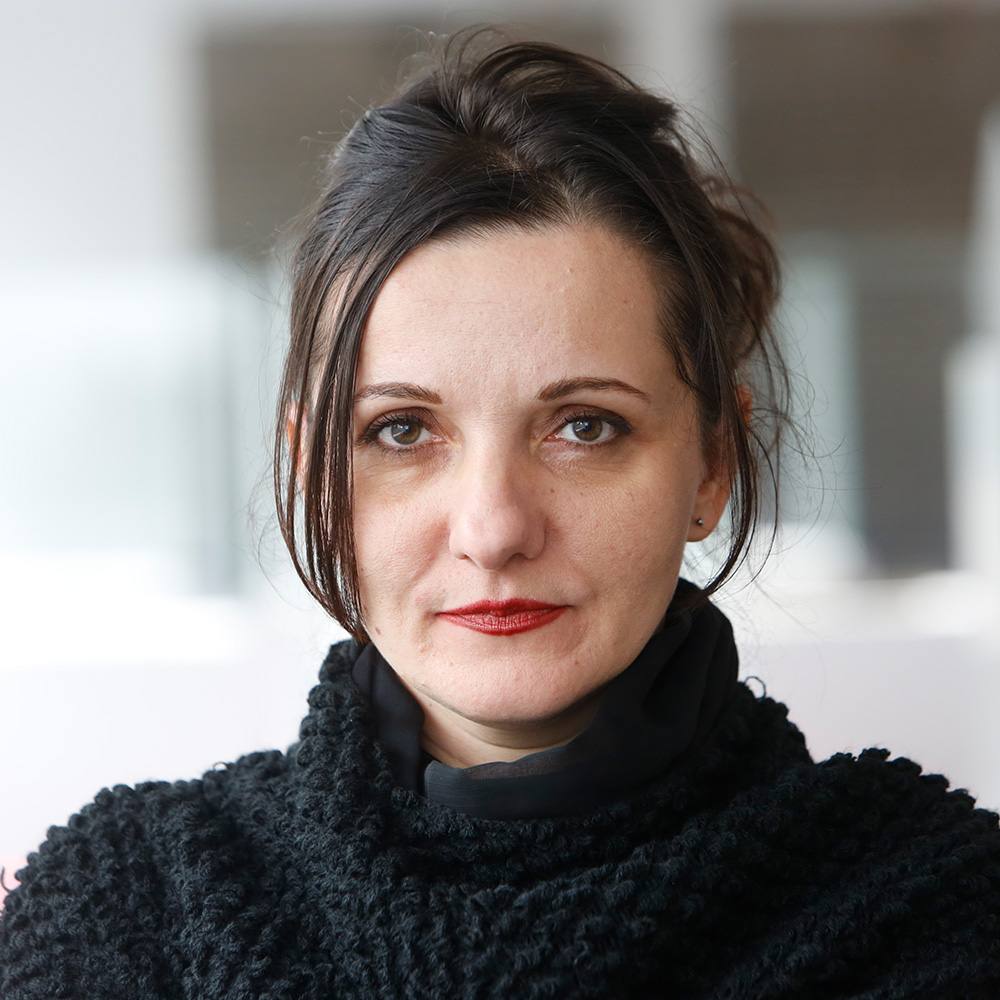
Armina Omerika
Photo: Uwe Dettmar
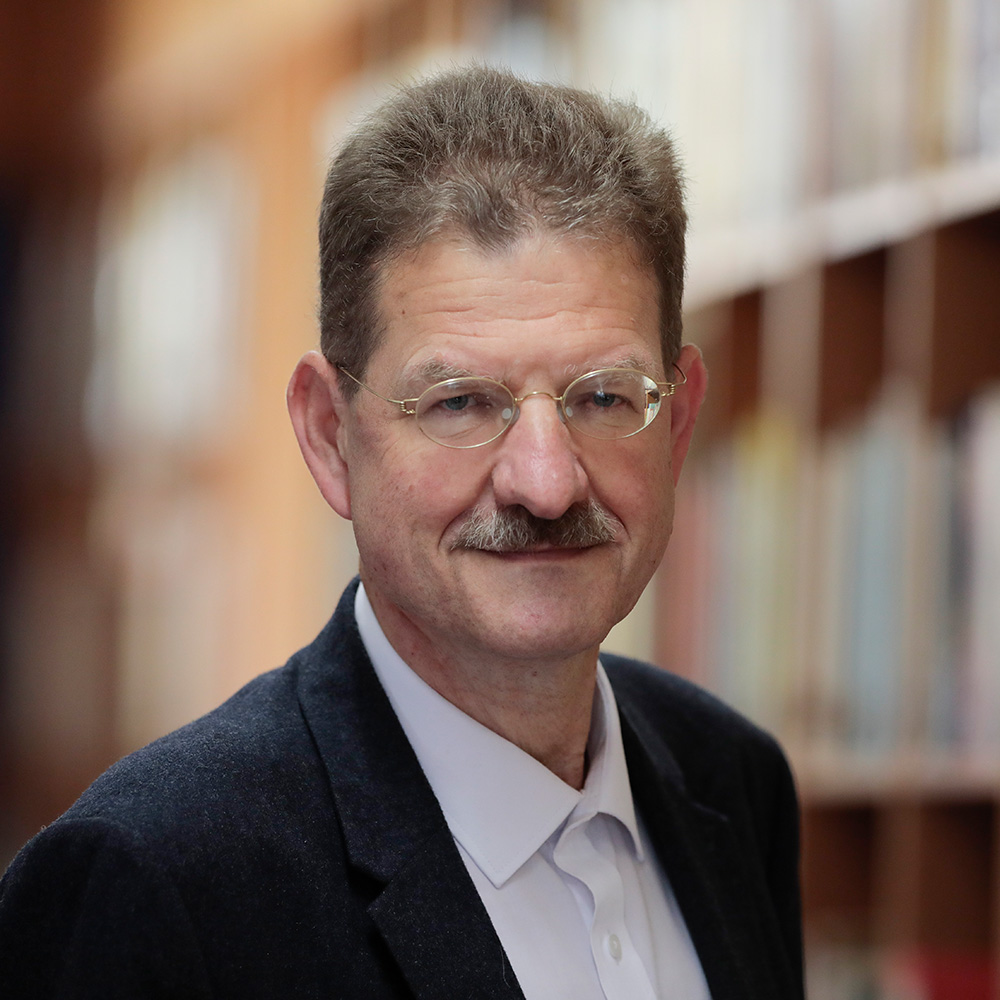
Christian Wiese
Photo: Uwe Dettmar
How do you experience the situation on campus after the terrorist attacks on October 7 and in the course of the ongoing Israeli operation in Gaza? What reactions are you getting from students in your subjects?
Prof. Christian Wiese: Among my students, doctoral candidates and staff – both Jewish and non-Jewish – many of whom have direct ties to Israel, there was a strong feeling of grief, pain and powerlessness in the first few days after the terrorist attacks. Conversations with Jewish students testify to great irritation, also about how differently the universities react to the increasing anti-Semitic voices and incidents in our society. As a liaison lecturer for the Ernst Ludwig Ehrlich Studienwerk, I also hear this from students from other cities. Despite positive experiences, which also exist, the feeling prevails that many people and institutions are speechless and lack solidarity. Nevertheless, there is also a lot of differentiation. Instead of common attributions according to which anti-Semitism comes primarily from Islam, in conversations with Jewish students I encounter a clear awareness that there are very different forms of anti-Semitism – especially in right-wing milieus, but also in the middle of society – and that the discussion about anti-Semitism must not be instrumentalized in debates about migration. At the same time, the need for an intensified dialog with Muslim students is discussed. What is happening in the subjects and departments to address the topic, but also the current situation of students here on site? What needs do you perceive?
Omerika: In our department, we have offered discussions in a safe space; we have not yet organized any major events on the topic. It's actually the case that I'm not asked about it in lectures. I can't yet say what the reason is. But I suspect that it's a general lack of speech that leads to the fear of saying something "wrong", for which you will always be attacked.
Wiese: The topic has not yet been actively addressed by students in my courses either. However, it is not only now that it is noticeable that many wish to fill gaps in their knowledge about the historical and political background to the conflict.
Omerika: I can confirm that: There is a lack of in-depth knowledge about the historical background. Knowledge is often selective and limited to what supports the own current view. There is a great need for action here, but it doesn't just start at the universities.
Wiese: We therefore want to offer courses on the history of Judaism, Zionism and the state of Israel even more systematically than before. We also want to intensify our events in the area of educational work critical of anti-Semitism.
How does the situation affect you as a researcher?
Omerika: It's depressing for me to hear something like that. Relatively quickly after October 7, there was an exchange among colleagues in Islamic Studies; a declaration by professors from Frankfurt and Giessen has since been endorsed by many representatives of Islamic theology in Germany. Among other things, the need to continue cross-religious, including Jewish-Muslim cooperation was emphasized. There is already quite a lot going on here, for example in Tübingen, in Berlin, but also in Frankfurt, where the new professorship for Jewish-Islamic relations was recently filled – this is quite unique in Germany.
Wiese: It is very important to me that such initiatives at Goethe University are strengthened by research networks such as the "Dynamics of the Religious" or the "Frankfurt-Tel Aviv Center", which researches the many facets of interreligious dynamics between Judaism, Christianity and Islam in the past and present. How do you yourself see the opportunities and tasks of the university, especially the humanities subjects, in terms of interreligious mediation work? What expectations are reflected to you by municipal partners?
Wiese: I am grateful right now that Frankfurt has a long tradition of cooperation between religious studies, Jewish studies, Christian theology and Islamic studies – in research and teaching. This will definitely not stop and sends a clear signal to our society.
Omerika: Absolutely! Apart from specific projects, we also know each other through everyday institutional life and cooperation, for example in teaching, and that continues. For some topics, I'm not necessarily confident that joint seminars would be particularly productive at the moment. But in the medium term, I see it as necessary to offer joint courses so that a multi-perspective approach is actually taken.
Wiese: If a place is suitable for such multi-perspectivity, then it should be the university. It is called upon to provide the space where different perspectives and narratives can be discussed in mutual respect. Our urban partners, such as the Jewish, Protestant and Catholic academies, also hope that the university will take a differentiated approach to the current situation, look at the suffering of both sides and contribute to understanding the causes of the conflict. The expectations of the Jewish Community of Frankfurt, which is an important partner not only of our project "Synagogue Memorial Book Hesse", but of the University as a whole, are on a different level. The greeting from the chairman of the Jewish community on the occasion of our conference clearly expressed the feeling of being left alone. The expectation placed on the university here is clear: it must live up to its social responsibility – through research and teaching, but also through public positioning.
Questions: Louise Zbiranski.
The interview was published in UniReport 6/23.
Photo: BMBF/Hans-Joachim Rickel
- Science communication
Do good and talk about it
This also applies to the researchers at Goethe University. In dialog with interested citizens, they explain science and make it understandable. Sometimes quite literally, as with the neutron star hands-on experience of the ELEMENTS research project. And sometimes in casual conversation, such as in the new Science Talk "Wissen angezapft" at various locations in the city. Another highlight of Goethe University Science Communication 2023 was 3rd place for the best press release of the year.
"Knowledge tapped": entertaining, informative – and pretty weird
Two researchers, a cabaret artist, a bar and music: this is all part of the ensemble of the new "Wissen angezapft" series at the Citizens' University. The first two Science Talks have already attracted many thirsty for knowledge to the Osthafen in the Kunstverein Familie Montez.
Does that go together? Out of the lab or lecture hall and into the alternative world of the Montez family. Scientists from Goethe University who passionately explain their research project and also tell us how they "wind down" after work or whether they even want to. A cabaret artist as presenter, who leads through the evening with a lot of humor and without fear of "stupid questions" when it becomes incomprehensible to laypeople. A shanty choir like from "Inas Nacht", which fills pauses for reflection with sea shanties. So does that go together? The first two events of the new Science Talk have shown that it can. And it's fun.
At the premiere on December 6, cabaret artist and presenter Britta Hoffmann was joined by political scientist Thomas Biebricher and chemist Alexander Heckel on the Kunstverein coach. On the second evening in the packed Kunstverein, pharmacist Maike Windbergs and nuclear physicist Norbert Pietralla, who had traveled from TU Darmstadt as co-spokesperson for the ELEMENTS cluster project, followed. What was discussed during the evenings: That researching the complex forces in a favorite atomic nucleus, namely molybdenum-94, can be exciting and life-filling (Pietralla); why it is important in our crisis-ridden times to understand that trust can arise in conflicts and how it is researched (Biebricher); what tricks are needed to get drugs to the right place in the body and what needs to be overcome in the process (Windbergs); and what needs to happen to light to help with healing (Heckel).
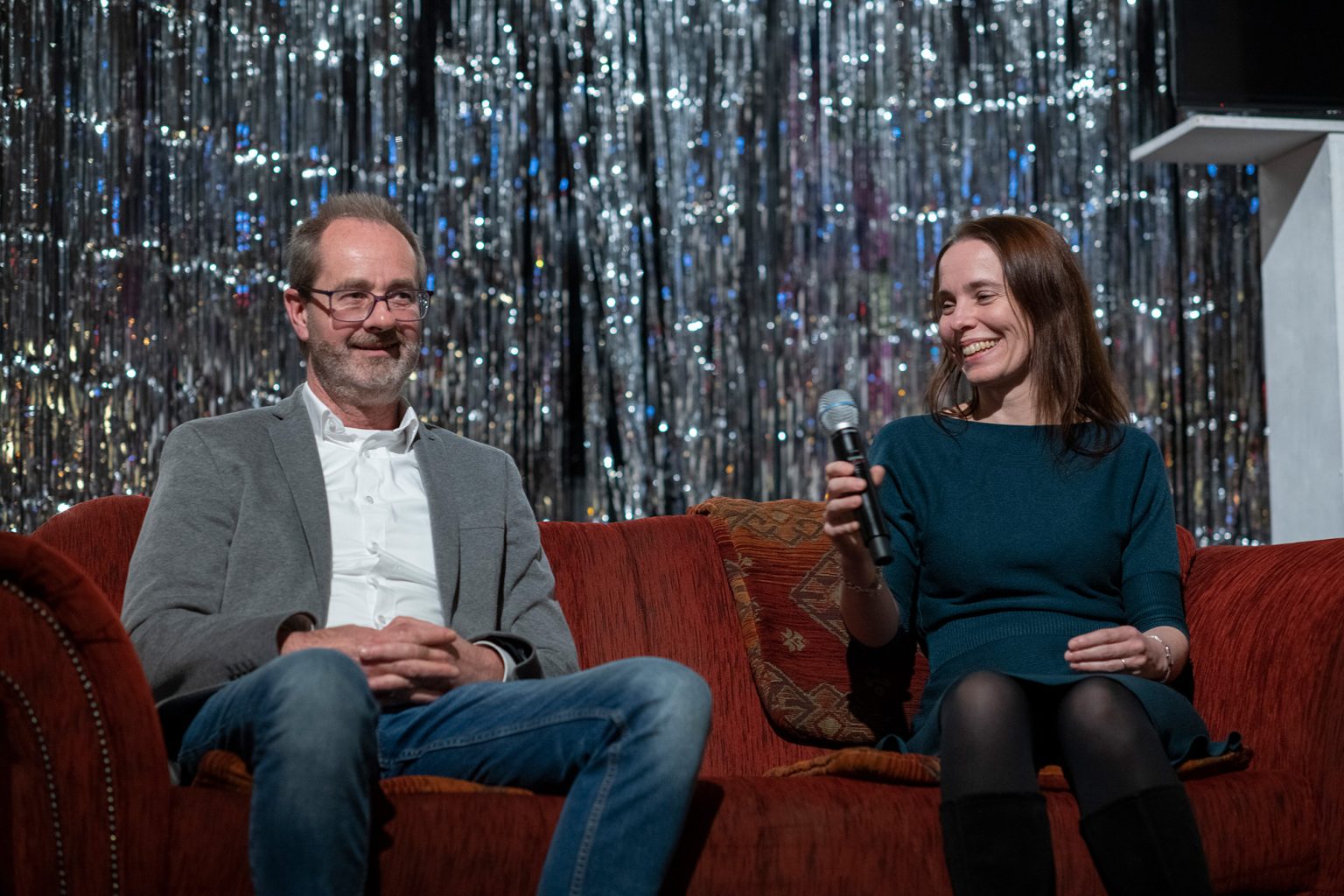
Valuable "waste" from neutron stars
However, the audience was able to learn much more from the lively discussions, also by asking their own questions. For example, that the gold from wedding rings and many other pieces of "hardware" on our planet come from the "waste" (Pietralla) of neutron stars. Why growing human tissue in a test tube is useful in the search for new therapies to heal wounds, but why animal experiments with mice are pointless (they have different wound healing mechanisms, according to Windbergs). And the audience listened with rapt attention when Alexander Heckel explained that, as an emergency paramedic in the rescue service, he founded a motorcycle squadron at the German Red Cross, which always arrived at the scene of an emergency before the ambulances at the Frankfurt marathon (the reason: "swarm intelligence").
When asked about her expectations before the start of the Science Talk, one participant from the audience said: "I have absolutely no idea what's coming next. But if it doesn't work out, then we'll just have a nice drink." At the end of the entertaining and informative evening, it was clear that there was no need to drink it up. This was also helped by the confident presenter Britta Hoffmann and the 14-member Eschersheim shanty choir, which was lively and applauded. Their maritime ballads contrasted beautifully with the excursions into the world of science at Goethe University. The Science Talk "Wissen angezapft", which takes place as part of the Citizens' University, will of course be continued.
pb
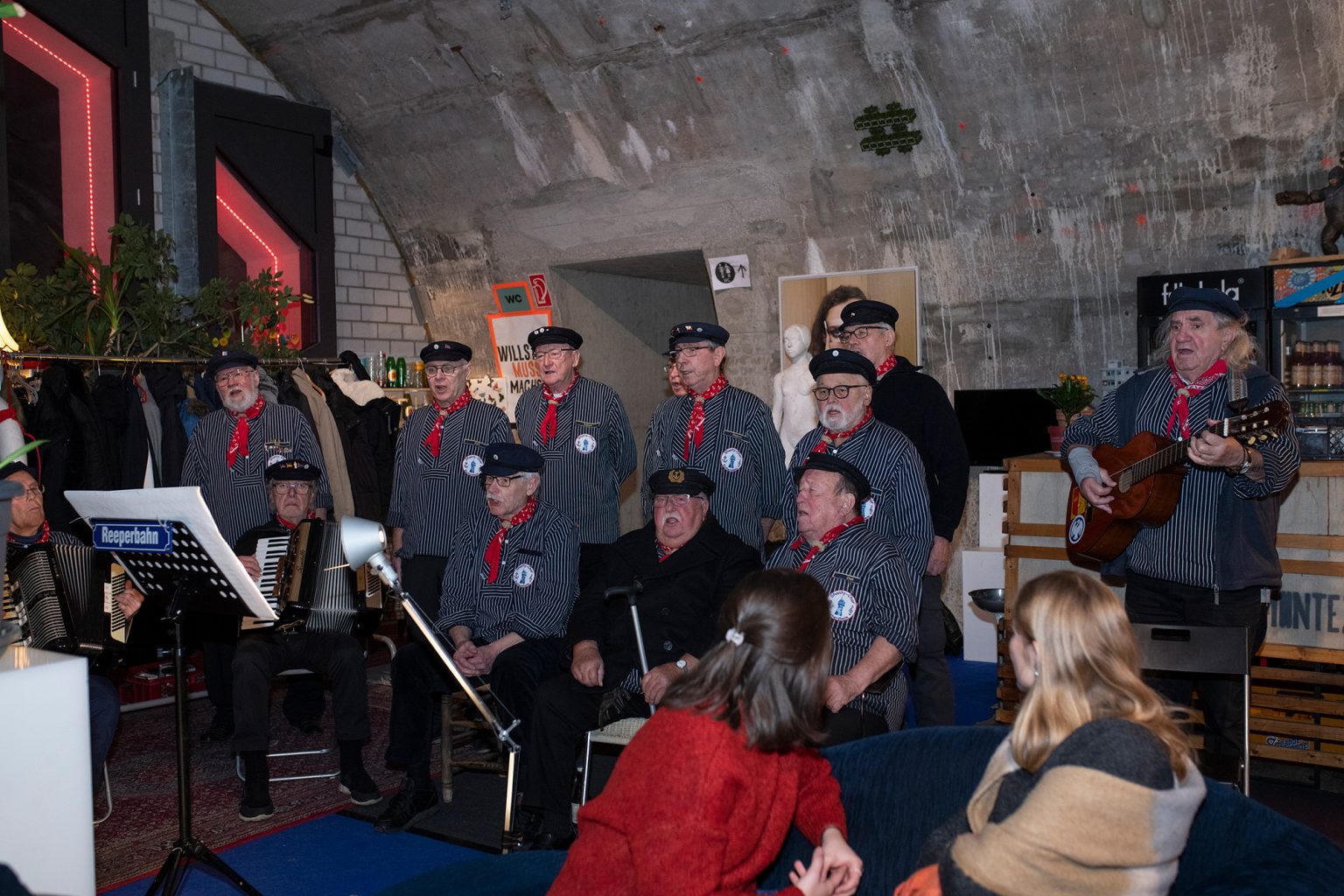
- Science communication
A star you can touch
You can open it up, look inside and let it inspire you to ask questions about the universe: Astrophysicists at Goethe University use the mobile neutron star to explain their research.
With the interactive exhibit of a neutron star, the ELEMENTS cluster project is breaking new ground in science communication. The hands-on object invites visitors to various events to discover this spectacular astronomical object layer by layer.
The aim is to get in touch with physics in the truest sense of the word. ELEMENTS not only explores astronomical phenomena, but also nuclear and particle physics. The neutron star combines both. Visually, it is a successful icebreaker, but it has it all. Complex processes take place inside it, which can be studied to varying degrees. Even the youngest visitors have fun puzzling the layers apart and back together again. Older children often bring questions about the universe with them. And teenagers and adults – with or without prior knowledge – also enjoy exploring the interior of the neutron star.
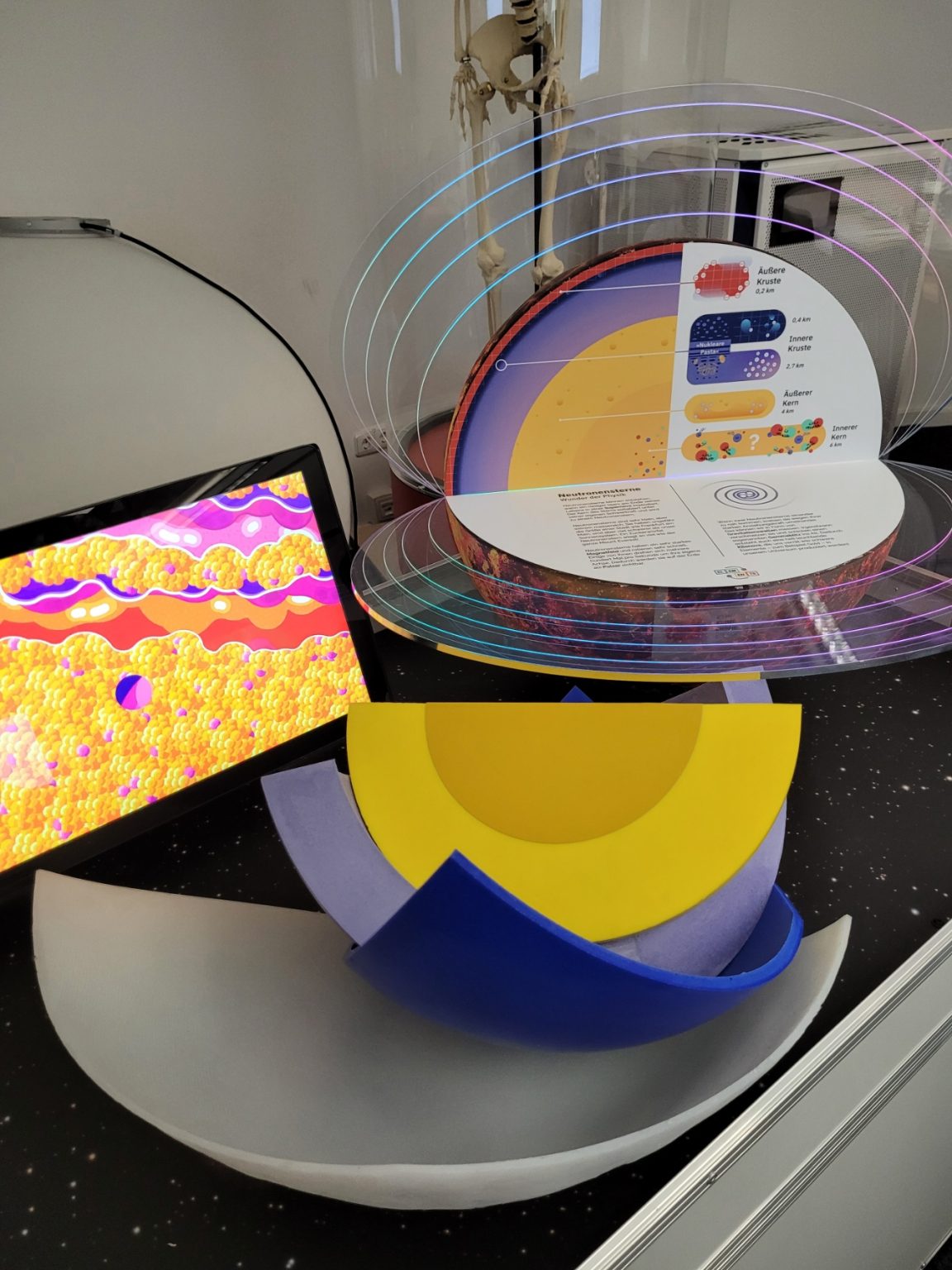
The mobile exhibit was used for the first time at Girls' Day in April 2023. Since then, the neutron star has been on display at numerous Goethe University events, such as the Night of Science and the Spring Festival. It also regularly travels to public events organized by project partners, such as the opening of the Science Castle at TU Darmstadt. It was also integrated into the "Universe on Tour" roadshow organized by the Federal Ministry of Education and Research in Hofheim. A highlight in 2023 was the trip to Kiel for the "Highlights of Physics" science festival with around 40,000 visitors.
pma/pb
- Science communication
3rd place for cosmic chocolates
How do you explain what is going on inside a neutron star? By comparing it to chocolate pralines, for example. For this idea, Goethe University received the idw prize for one of the best press releases of the year.
They must be of outstanding news value, professionally written and scientifically relevant: The three press releases that are honored once a year by the Informationsdienst Wissenschaft (idw). In 2023, Dr. Phyllis Mania from Goethe University's PR and Communications Office took third place in the idw prize for the best press releases of the year with the press release (PM) "Cosmic chocolate chocolates: Inner structure of neutron stars revealed".
A record number of 115 press offices had sent news from science and research appetizingly packaged into the race. In addition to Goethe University, the press offices of ETH Zurich (1st place) and the Alfred Wegener Institute (2nd place) received awards.
Around 20,000 press releases from more than 1,000 scientific institutions are distributed annually on the websites of the Informationsdienst Wissenschaft (idw).
pma/pb
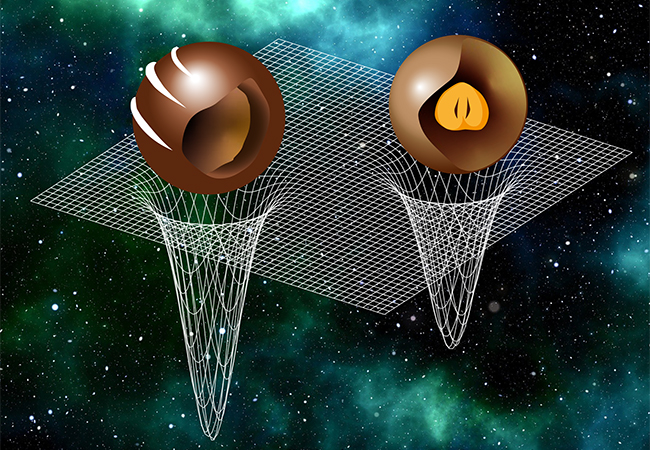
- Communication
About stardust, AI and talking hands
Around 1,500 children learned why gold cannot be produced in a laboratory at the 20th Frankfurt Children's University
The 20th edition of Frankfurt Children's University in October was once again a real "street sweeper": more than 1000 children pricked up their ears at each of the morning lectures to learn about stardust, the intelligence of machines and the role of facial expressions and gestures in speech.
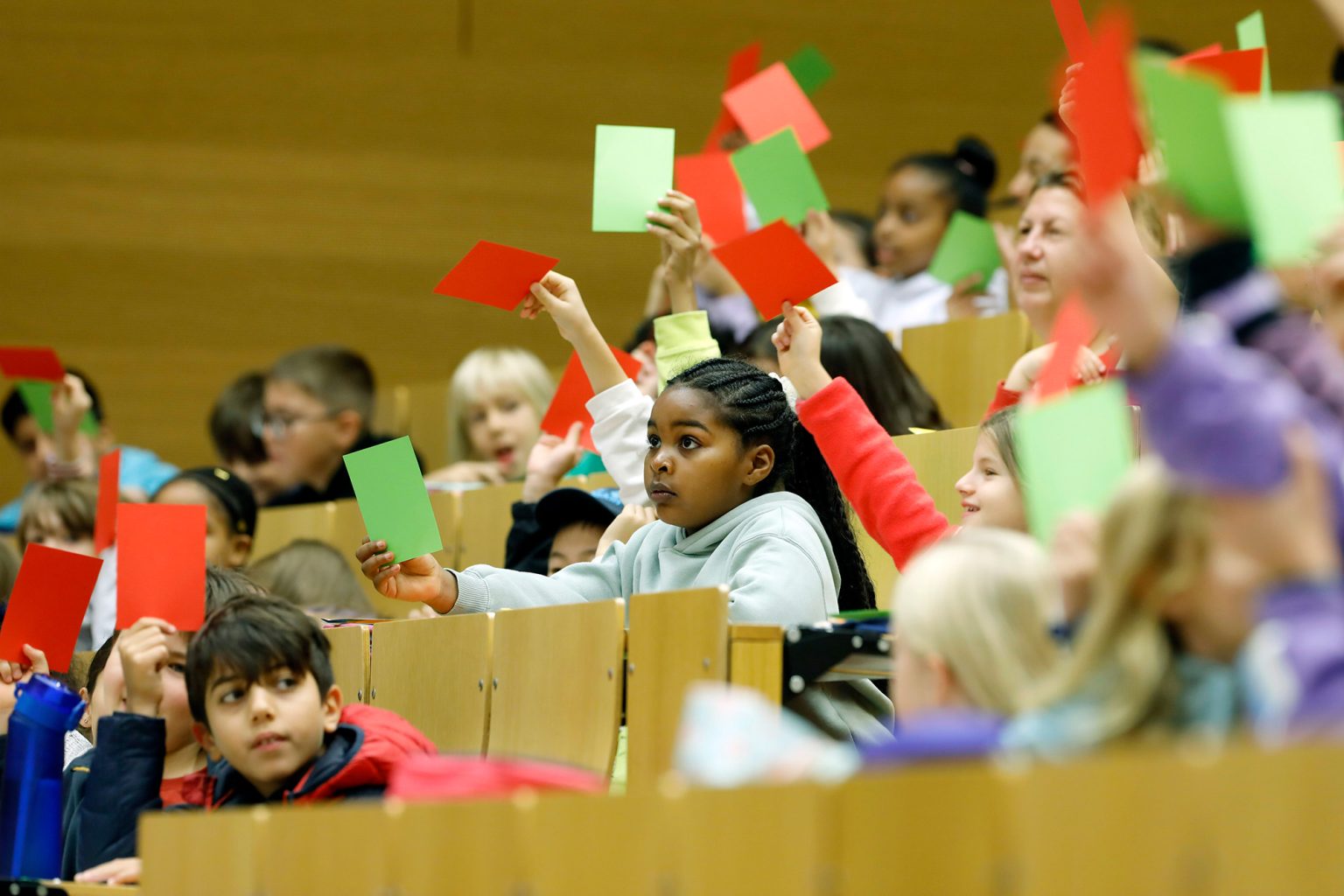
Why can't gold simply be produced in a laboratory? Physics professor Camilla Juul Hansen and her colleague Dr. Tanja Heftrich investigated this question and looked far into space. Unbelievable, but true: the colors of the stars reveal which elements are present there. Computer scientist Professor Andreas Dengel and his young audience considered whether machines are really smart and the mechanisms behind "artificial intelligence". Penguins and a magic lamp played a really important role in this.
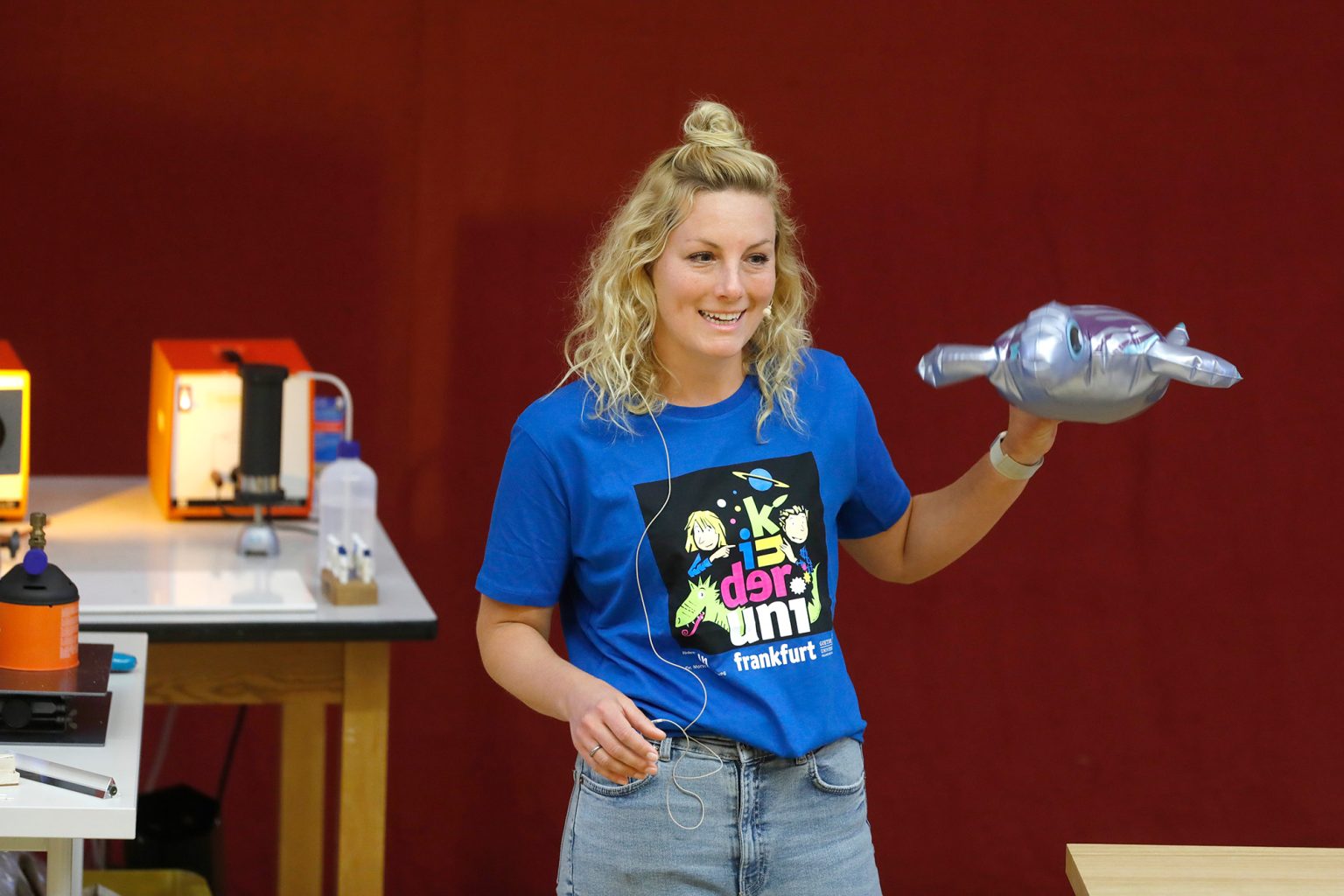
Professor Cornelia Ebert and Professor Markus Steinbach (University of Göttingen) got to the bottom of a very commonplace phenomenon in their lecture on facial expressions and gestures. What is the purpose of this form of "visual communication"? And what distinguishes facial expressions and gestures from the language of the deaf? For better clarity, the two linguists' lecture was simultaneously interpreted by sign language interpreters.
asa
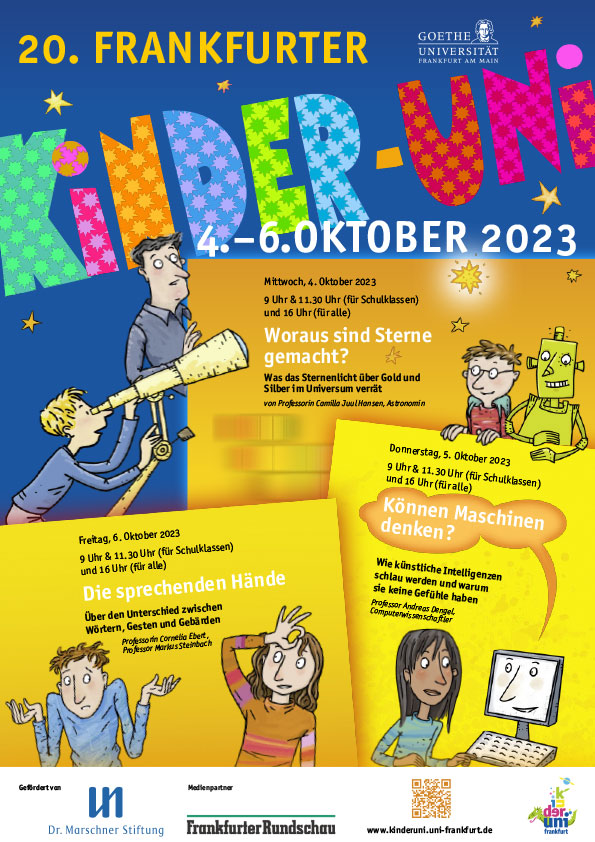
Graphic: shutterstock
- Transfer
Therapeutic approaches against flaviviruses promoted industrially
Researchers at Goethe University, together with partners from the life science and pharmaceutical industries, have launched a project to develop a new class of active substances against flaviviruses. This could be used to cure infectious diseases such as dengue fever in the future.
The desire to travel and climate change mean that viruses transmitted by mosquitoes are also spreading more and more in Europe. The class of flaviviruses, which includes the dengue, Zika, West Nile and yellow fever viruses, cause serious neurological diseases for which there are currently insufficiently effective vaccines and no specific treatment options.
In an innovative research approach, Prof. Harald Schwalbe and his team at Goethe University are using a patented NMR-based screening method, , to identify small molecules that specifically bind to highly conserved RNA structures of the viruses and interrupt the viral infection cycle. "Over the last three years, we have learned a lot about how to fight the SARS-CoV2 virus with small molecules," said Prof. Harald Schwalbe, Director of the Institute of Biochemistry II. "The new collaboration now allows us, together with industrial professionals, to apply our knowledge to viruses transmitted by mosquitoes, whose range is expanding in the context of climate change." As part of the beLAB2122 collaboration between Evotec and Bristol Myers Squibb, the new drug candidates will be jointly identified, structurally characterized and tested for efficacy.
Goethe University has been a member of the life science cooperation beLAB2122 since 2021. This aims to bring together academic institutions from the Rhine-Main-Neckar region with industrial partners in order to efficiently advance first-in-class therapeutic options for all indication areas and formats into investment-ready drug research and early development projects. "With the beLAB2122 program, promising therapeutic approaches can be developed and tested together with pharmaceutical partners from an early stage of development," says Dr. Kirstin Schilling, Managing Director of Innovectis GmbH, the technology transfer company of Goethe University. "In this way, knowledge can be transferred efficiently from basic research to the clinic."
df
You can find information on other industrial cooperations under short & sweet.
Innovations from Goethe University
- Short & sweet
Spun off
Prof. Andreas Hackethal's team is building a bridge from science to business with an app for individual pension overviews and Prof. Dr. med. Andreas Anton Schnitzbauer's team with its app for patient care.
With the Seasn app, the Pension Finance Lab at the Leibniz Institute SAFE has developed a science-based application that simplifies individual pension overviews and enables personal pension planning. The team led by Prof. Andreas Hackethal, Coordinator of the Pension Finance Lab at the Leibniz Institute SAFE and Professor of Personal Finance at Goethe University Frankfurt, brings together information from occupational, statutory and private pension schemes in Germany in the app and takes into account different life and income scenarios. The Seasn app provides an answer to the question of whether the future pension will be sufficient for the current standard of living and what can be done to ensure financial security in old age.
The start-up "capreolos. Pioneering digital prehabilitation" for better patient care gives patients and doctors the opportunity to prepare for a major surgical procedure. The app developed by the international team of doctors from Goethe University, Frankfurt University Hospital and other partners provides comprehensive information and gives patients an exercise program that they can use to improve their fitness before surgery.
www.seasn.de; www.capreolos.com
Award-winning start-ups
The Goethe University start-up center managed by Innovectis, the Goethe-Unibator, is hosting the Goethe SDG (= Sustainable Development Goals) Contest award ceremony for the second time on the Westend campus in July. Five finalists qualified for the final round: Maple Tales, Save the Grain, Rest:art, FLIPoQ and Phont.
The Goethe-Unibator/Innovectis awards a prize
Goethe Innovation Award
The Goethe Innovation Prize 2023 for research projects with start-up potential will be awarded in December for therapeutic approaches against antibiotic resistance and for the treatment of chronic itching as well as an innovative bio-printer technology. For the second time, Innovectis, the university's technology transfer company, organized a pitch competition to select the winning teams – five teams qualified. The three winning teams won prize money as well as participation in the Unibator start-up program.
The 1st prize went to Clara Börnsen and Reinke T. Müller from the Institute of Molecular Sciences and the Institute of Biochemistry. In their project entitled "Antibiotics Reloaded: the return of effective antibiotics", the researchers are developing inhibitors to overcome antibiotic resistance.
"Foundation stone" for Campus Westend
Prof. Werner Meißner, President of Goethe University from 1994 to 2000, receives the Hessian Order of Merit. Meißner had campaigned for the purchase of the Poelzig Building by the state and thus created the conditions for the new location of Goethe University, the current Westend Campus.
Sustainable advice
Katrin Böhning-Gaese from Senckenberg, Professor at Goethe University, is to become a member of the German Council for Sustainable Development. The biodiversity expert and winner of the 2021 German Environmental Award has been appointed to the 15-member body, which advises the German government on sustainable development issues.
Member of the German Council for Sustainable Development
Culture Prize
Anne Bohnenkamp-Renken, Professor of Modern German Literature at Goethe University and Director of the Deutsches Hochstift in Frankfurt, has been awarded the Hessian Culture Prize. With this award, the state of Hesse honors the services of the director of the Goethe House and the German Romantic Museum in Frankfurt for literature and research.
Goethe University congratulates Anne Bohnenkamp-Renken on winning the Hessian Culture Prize
Improve pension provision
The economist Prof. Raimond Maurer has been appointed to the "Focus Group on Private Pension Provision" set up by the German government. Its aim is to develop proposals for improving funded pension provision in Germany.
40 years of U3L
The 40th anniversary of the University of the Third Age (U3L) is celebrated at a festive event and the 100th birthday of its Chairman Günther Böhme is honored.
A passion for education: 40 years of the University of the 3rd Age (U3L)
Transfer to school
The BMBF-funded joint project "Leistung macht Schule – Transfer in die Schullandschaft (LemaS-Transfer)" starts with the sub-project "Steuergruppe, Regionalzentrum Mitte-West, Sprachen und Partizipative Forschung" based at Goethe University.
Return of collection items
The collections at Goethe University are testing ways to make African collections more accessible globally: Two projects funded by the Center for Interdisciplinary African Studies (ZIAF) will be presented at an exhibition opening in the Schopenhauer Studio of the Johann Christian Senckenberg University Library. It is about the exhibition "We are happy to see these things" and the project "Open Africoll GU".
Thinking university collections globally
City cycling
Goethe University is once again part of the CITY CYCLING campaign and this year is setting an example for climate-neutral mobility as part of the "Cycling for Science: Goethe, Senckenberg & Friends" team.
Elected for child protection
Prof. Sabine Andresen, Professor of Educational Science with a focus on social pedagogy and family research at Goethe University, is elected as the new President of the Kinderschutzbund.
Science meets Regions
As part of the European Commission's Science Meets Regions program and the Mercator Science Policy Fellowship program, ten employees from state ministries, regional councils and city administrations from Hesse and Rhineland-Palatinate held almost 80 discussions with researchers on the topics of green and digital transformation in May and June. The topics ranged from integrated energy systems, resilient digital infrastructures, housing and transport to digital change and green finance.
Mercator Program
As part of the Mercator Science-Policy Fellowship Program, 45 executives from federal and state ministries and the European Commission will visit Goethe University. There will be further meetings in June and November 2023.
Peeking out of the university
Goethe University is organizing job fairs for computer scientists, mathematicians, humanities scholars, cultural and social scientists and economists in the summer semester 2023.
ENTER ZUKUNFT: 4x job market prospects for students
University and society
At the Senate meeting on May 24, the Executive Board and Senate agreed to set up a commission to develop a self-image of Goethe University for the transfer of knowledge and technology in interaction with society. This was prompted by controversies in the context of the conference "Managing migration, shaping plurality. Challenges of immigration policy in Germany".
Poetry lecture
Clemens J. Setz, winner of the 2021 Büchner Prize, will give the first of three poetry lectures on the topic of "Mysteries" at Goethe University in 2023. The lectures will be accompanied by a student exhibition and an academic workshop and will conclude with a reading at the Frankfurter Literaturhaus.
The new poetry lecturer Clemens J. Setz
Comprehensive partnership
The exchange of students between the National Taiwan Normal University and Goethe University is to become even more extensive from now on. This was decided by both universities in July during a visit by a high-ranking delegation from the Taiwanese partner university. Just last year, both universities signed a joint Memorandum of Understanding, expressing their interest in a university-wide partnership.
National Taiwan Normal University and Goethe University
RMU-Career Weeks
The digital "RMU Postdoc Career Weeks" of the Rhine-Main Universities serve to inform, qualify and network Early Career Researchers (ECR).
Pictures for Human Rights
An open-air exhibition on the Westend campus of Goethe University is showing 30 works of art on the Universal Declaration of Human Rights.
Thinking Democracy
What role do works of art and monuments in public spaces play for democracy? To kick off its series of events "DenkMalDemokratie: Dialogische Spaziergänge zur Kunst", the Citizens' University invites you to take a walk around St. Paul's Church.
Democracy dialog with monuments and art
Giving identity
The United Nations Population Fund (UNFPA) in Mexico and Goethe University sign a cooperation agreement to support the Mexican government in the identification of disappeared persons in Mexico.
Giving unknown dead in Mexico an identity again
75th time
A commemorative event recalls that on July 1, 1948, the Allied military governors presented the "Frankfurt Documents" to the West German minister presidents in the room now known as the "Eisenhower Hall" in the IG Farben building. The event, which now marks the 75th anniversary of the founding of the Federal Republic of Germany, gave the starting signal, so to speak.
"Starting signal" for the founding of the Federal Republic
RMU funding
The Strategic Alliance of the Rhine-Main Universities (RMU) of Goethe University, Technische Universität Darmstadt and Johannes Gutenberg University Mainz has included a total of 13 further RMU-wide interdisciplinary cooperation projects in the RMU's project funding program as part of the latest calls for proposals of the RMU Teaching Initiative Fund and the "ECR" and "Networking" funding lines. Across all universities, 418,000 euros were approved, of which 138,000 euros will benefit the work of researchers at Goethe University.
www.rhein-main-universitaeten.de
Main-Study
Thousands of high school graduates, students from upper secondary schools and technical colleges get to know Goethe University on site during the "MainStudy".
Get a taste of university life
The teachings of St. Paul's Church
A prominent panel discussion on the lessons of the history of St. Paul's Church for the future of democracy concludes the Deutsche Bank Endowed Guest Professorship "Science and Society" series.
Democracy as a construction site
Canon with gaps
Because works by women and marginalized texts are severely underrepresented on reading lists, the #breiterkanon network is developing a "gap list". An exhibition at Frankfurt University Library presents it.
Of lists and gaps, readings and recommendations
Regional future
The skilled labor initiative of the Hessian Ministry for Social Affairs and Integration, together with the Institute for Economy, Work and Culture (IWAK) at Goethe University, is presenting the initial results of its regional future workshops.
Skilled labor initiative focuses increasingly on regionality
Teddies at the dentist
After a long corona break, the Center of Dentistry, Oral and Maxillofacial Medicine (Carolinum) at Goethe University is once again inviting kindergarten groups to the popular Teddy Tooth Clinic.
Teddies in the dentist's chair
DAAD Prize
Master's student Farbod Eslami Khouzani from Tehran (Iran) will be honored at the DAAD Prize 2023 for international students with outstanding academic achievements and social commitment.
Heart up close
Knowledge in action: The Cardio-Pulmonary Institute at Goethe University invites interested parties to take a look at its day-to-day research.
Experience cardiovascular research up close
Uni at the movies
How do films deal with abuse in religious contexts? This is the question posed by a film series of the "Schnittstelle Religion" science platform at Goethe University, which is being shown in cooperation with the Cinéma am Roßmarkt.
Cinema, church and sexual violence
Therapeutics
The High-Performance Center Innovative Therapeutics (TheraNova), which aims to establish a scientific-industrial cluster in the Rhine-Main region, continues to receive funding from the state of Hesse. In this cluster, Goethe University cooperates with the two Fraunhofer Institutes for Translational Medicine and Pharmacology ITMP in Frankfurt/Main and for Computer Graphics Research IGD in Darmstadt as well as with the Max Planck Institute for Heart and Lung Research in Bad Nauheim.
Opportunity for schools
The Frankfurt Campus Schools program is officially launched. The aim is to systematically bring school practice, educational research and teacher training into a constructive and lasting exchange for all sides. The program is supported by the DIPF | Leibniz Institute for Research and Information in Education and the Goethe University Frankfurt.
Improving educational opportunities together
Germany Scholarship
At the award ceremony for the Deutschlandstipendium, 550 new scholarship holders will meet their sponsors. 990,000 euros have been raised at Goethe University in 2023, so 1,980,000 euros will be available for the Deutschlandstipendium, doubled by the federal government.
When scholarship holders meet their sponsors
Tested water
Environment Minister Hinz launches the Hesse-wide Hessian Water Competence Center (KWH), in which stakeholders from science and education, administration, politics and water management are networked, with a kick-off event at Goethe University.
Hesse Water Competence Center launches
Federal Cross of Merit
Prof. Dr. Sandra Ciesek receives the Federal Cross of Merit. The Director of the Institute of Medical Virology at Frankfurt University Hospital is being honored for her significant work in the search for drugs and the clarification of SARS-CoV-2.
Prof. Dr. Sandra Ciesek was awarded the Federal Cross of Merit
